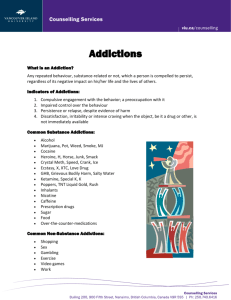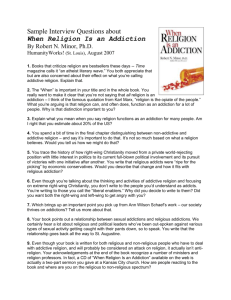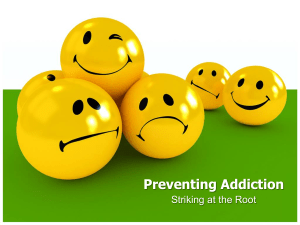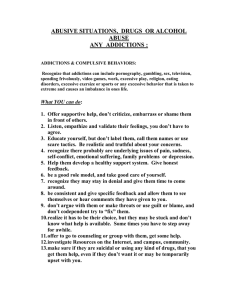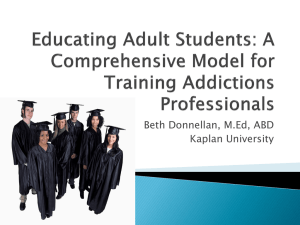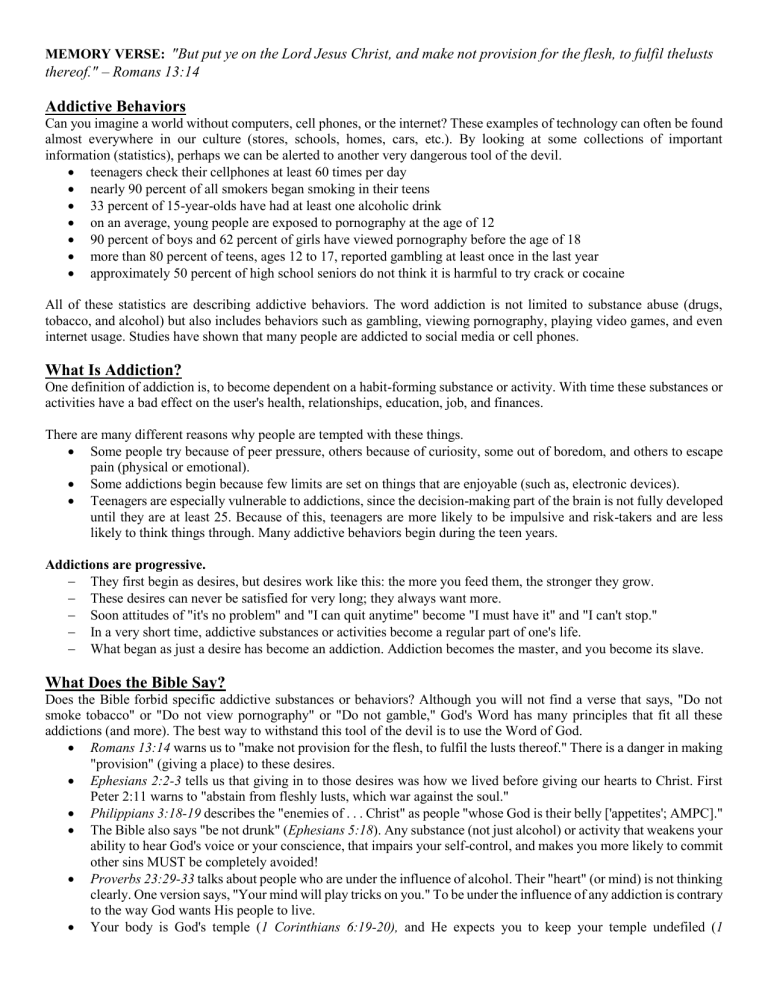
MEMORY VERSE: "But put ye on the Lord Jesus Christ, and make not provision for the flesh, to fulfil thelusts thereof." – Romans 13:14 Addictive Behaviors Can you imagine a world without computers, cell phones, or the internet? These examples of technology can often be found almost everywhere in our culture (stores, schools, homes, cars, etc.). By looking at some collections of important information (statistics), perhaps we can be alerted to another very dangerous tool of the devil. teenagers check their cellphones at least 60 times per day nearly 90 percent of all smokers began smoking in their teens 33 percent of 15-year-olds have had at least one alcoholic drink on an average, young people are exposed to pornography at the age of 12 90 percent of boys and 62 percent of girls have viewed pornography before the age of 18 more than 80 percent of teens, ages 12 to 17, reported gambling at least once in the last year approximately 50 percent of high school seniors do not think it is harmful to try crack or cocaine All of these statistics are describing addictive behaviors. The word addiction is not limited to substance abuse (drugs, tobacco, and alcohol) but also includes behaviors such as gambling, viewing pornography, playing video games, and even internet usage. Studies have shown that many people are addicted to social media or cell phones. What Is Addiction? One definition of addiction is, to become dependent on a habit-forming substance or activity. With time these substances or activities have a bad effect on the user's health, relationships, education, job, and finances. There are many different reasons why people are tempted with these things. Some people try because of peer pressure, others because of curiosity, some out of boredom, and others to escape pain (physical or emotional). Some addictions begin because few limits are set on things that are enjoyable (such as, electronic devices). Teenagers are especially vulnerable to addictions, since the decision-making part of the brain is not fully developed until they are at least 25. Because of this, teenagers are more likely to be impulsive and risk-takers and are less likely to think things through. Many addictive behaviors begin during the teen years. Addictions are progressive. They first begin as desires, but desires work like this: the more you feed them, the stronger they grow. These desires can never be satisfied for very long; they always want more. Soon attitudes of "it's no problem" and "I can quit anytime" become "I must have it" and "I can't stop." In a very short time, addictive substances or activities become a regular part of one's life. What began as just a desire has become an addiction. Addiction becomes the master, and you become its slave. What Does the Bible Say? Does the Bible forbid specific addictive substances or behaviors? Although you will not find a verse that says, "Do not smoke tobacco" or "Do not view pornography" or "Do not gamble," God's Word has many principles that fit all these addictions (and more). The best way to withstand this tool of the devil is to use the Word of God. Romans 13:14 warns us to "make not provision for the flesh, to fulfil the lusts thereof." There is a danger in making "provision" (giving a place) to these desires. Ephesians 2:2-3 tells us that giving in to those desires was how we lived before giving our hearts to Christ. First Peter 2:11 warns to "abstain from fleshly lusts, which war against the soul." Philippians 3:18-19 describes the "enemies of . . . Christ" as people "whose God is their belly ['appetites'; AMPC]." The Bible also says "be not drunk" (Ephesians 5:18). Any substance (not just alcohol) or activity that weakens your ability to hear God's voice or your conscience, that impairs your self-control, and makes you more likely to commit other sins MUST be completely avoided! Proverbs 23:29-33 talks about people who are under the influence of alcohol. Their "heart" (or mind) is not thinking clearly. One version says, "Your mind will play tricks on you." To be under the influence of any addiction is contrary to the way God wants His people to live. Your body is God's temple (1 Corinthians 6:19-20), and He expects you to keep your temple undefiled (1 Corinthians 3:17); in other words, free of dirt of pollution. Because addictions affect your thinking, you will become less and less interested in reading your Bible, praying, meditating, and attending church services. Your ability to think clearly about spiritual things will become impaired. God will no longer have first place in your heart. What Should You Do? Are we all familiar sa slogan na “Just Say NO!”, diba since 1980s pa mani? Likewise, 1 Corinthians 10:14 tells us to "flee from idolatry" (idolatry is anything that you want more than God). The best way to prevent addictions is to never give in to those desires, not even once! Yet, it is not only a matter of self-control. You need God's help to withstand these temptations. "Put ye on the Lord Jesus Christ" (Romans 13:14). What if you have given in to temptation and tried some of the habit-forming substances or activities describedin this lesson? What should you do about it? First, it is most important that you ask God to forgive you and give youthe strength to resist temptations in the future. It might be necessary to include fasting with prayer (Matthew 17:21). Second, talk to someone who can pray with you and give you good spiritual advice. Do not try to handle this by yourself. Third, recognize and remove triggers. Are there certain friends, places, songs, movies, or videos that makeyou more likely to give in? Do you have certain thought patterns that enable your addictions? If so, it is time to replace old friends and old habits with new ones. Last, but not least, identify and begin to work on the reason you gave in to the temptation. What is in the heart will come out. Someone with a godly heart desire to "glorify God"in his or her body and spirit (1 Corinthians 6:20). However, a weak spiritual heart will have little or no resistance to temptations. When it comes to addictions, many people feel that there is no hope, but God's Word says, "I can do all things through Christ which strengthen me" (Philippians 4:13). If you want to get rid of an appetite – Tim Elmore you must starve it, not feed it you must be intentional, not accidental you must replace it, not ignore it
